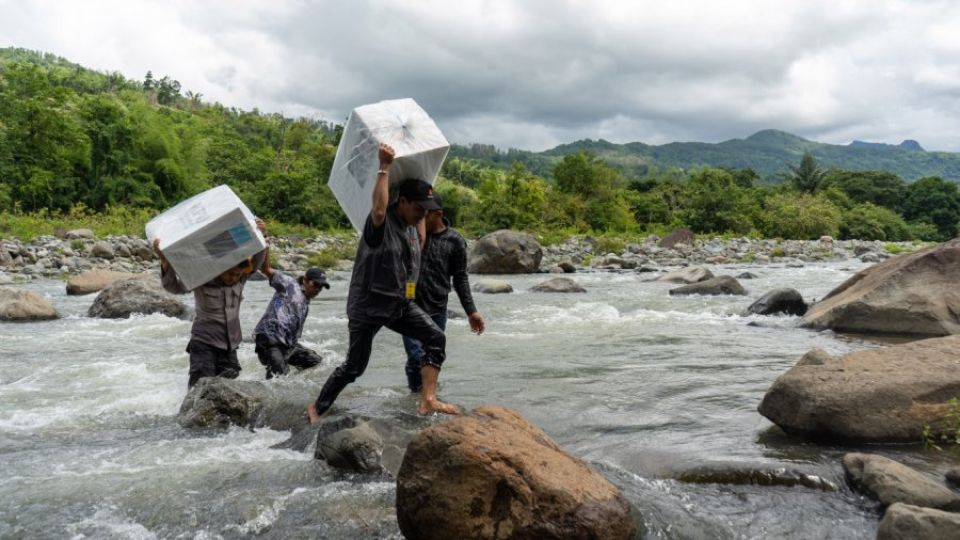November 27, 2024
JAKARTA – Indonesia will hold on Wednesday its first-ever nationwide simultaneous regional elections, the largest in the nation’s history, to elect local leaders, who will influence the power play at the national level over the next five years.
Over 200 million voters will head to the polls to elect their local leaders across 545 regions, namely 37 governors, 93 mayors and 415 regents, as well as their respective deputies, making Wednesday’s event one of the largest elections in the world.
Every voter will cast two ballots in their respective regions, one for a governor and the other for either a mayor or a regent. The exception is Jakarta, where voters will only elect a governor.
Polling stations will operate from 7 a.m. to 1 p.m., with vote counting commencing immediately afterward and continuing until Dec. 16, said General Elections Commission (KPU) chairman Mochamad Afifuddin.
“The KPU is ready to hold simultaneous regional elections. Logistical needs have been distributed to all polling stations. We urge voters to exercise their right to vote and celebrate the election festivity,” Afifuddin told a live-streamed press conference on Monday.
The National Police will deploy their personnel across the country to ensure security during the elections, with the help of personnel from the Indonesian Military (TNI).
High stakes elections
Wednesday’s elections will see the struggle for political dominance between the Onward Indonesia Coalition (KIM), the big-tent coalition of parties aligned with President Prabowo Subianto and Vice President Gibran Rakabuming Raka and his predecessor, Gibran’s father, Joko “Jokowi” Widodo, and former president Megawati Soekarnoputri’s Indonesian Democratic Party of Struggle (PDI-P).
Among the high-stake contests are those in at least four battleground provinces. Three of them are located in the most populous island of Java: Jakarta, Central Java and East Java, the other in North Sumatra, the most populous province outside Java where KIM-backed candidates are facing off against candidates backed by the PDI-P.
Read also: Central Java election: Battle of two generals on PDI-P turf
The results of the upcoming local elections will determine how effectively the programs of the Prabowo administration will be delivered on the ground over the next five years, which will be key to his reelection bid in 2019, analysts have said.
“The more KIM candidates are elected, the easier and quicker it will be for Prabowo’s government to implement the programs he has promised,” said political expert Nicky Fahrizal of the Jakarta-based Centre for Strategic and International Studies (CSIS).
One such initiative is the free nutritious meal program Prabowo promised on the campaign trail in the February presidential election as a way to address malnutrition among children and pregnant women from poor communities.
The plan, for which the government has set aside Rp 71 trillion (US$4.5 billion) for next year, has been piloted in schools in cities such as Jakarta and Semarang in Central Java. It aims to reach 82.9 million people by 2029, with an expected budget of Rp 400 trillion.
Power tussle
The stakes are also high for the PDI-P, the largest party in the House of Representatives and the only de-facto opposition party after parting ways with former president Jokowi, who left the party to support Prabowo and Gibran in February’s presidential election.
A victory in key provinces, such as the current capital Jakarta and Central Java, would give PDI-P matron Megawati a greater bargaining position to negotiate with Prabowo should she decide later to join the government, including a chance to secure more strategic cabinet seats, Nicky said.
Read also: Jokowi hits campaign trail as preferred candidates lag in polls
“Triumphs in strategic provinces, such as Central Java and Jakarta, would also give the PDI-P a huge morale boost if Megawati later decides in the party’s national congress next year that the party should play an opposition role toward the government, and in the long run in the 2029 [presidential and legislative elections],” Nicky said.
Meanwhile, having Jokowi’s allies beat the PDI-P in key provinces, such as Central Java, the traditional stronghold of the PDI-P, may impede the chances of Prabowo disassociating himself from Jokowi and forging an alternative alliance with the PDI-P, Nicky said.
Since Prabowo and Gibran’s sweeping victory in the February election, aided by Jokowi’s clout and tacit support over a decade in power, reports about tensions between Prabowo and Jokowi have surfaced multiple times, as the two maneuver to use the regional elections to consolidate power.
“Jokowi-backed candidates winning key battlegrounds would be a clear indication that Jokowi, not only still has influence after stepping down, but could also lock and drive Prabowo to some degree,” Nicky added.
A triumph of any Jokowi-backed candidates would also help the former president, who is not a member of any political party, to extend the life of his political dynasty, Nicky said.
“Taking over PDI-P strongholds such as Central Java will help [Jokowi] prepare and consolidate the support base for Gibran so he can run again in 2029 either as Prabowo’s running mate or against the incumbent, and for [Jokowi’s youngest son] Kaesang Pangarep,” Nicky said.


